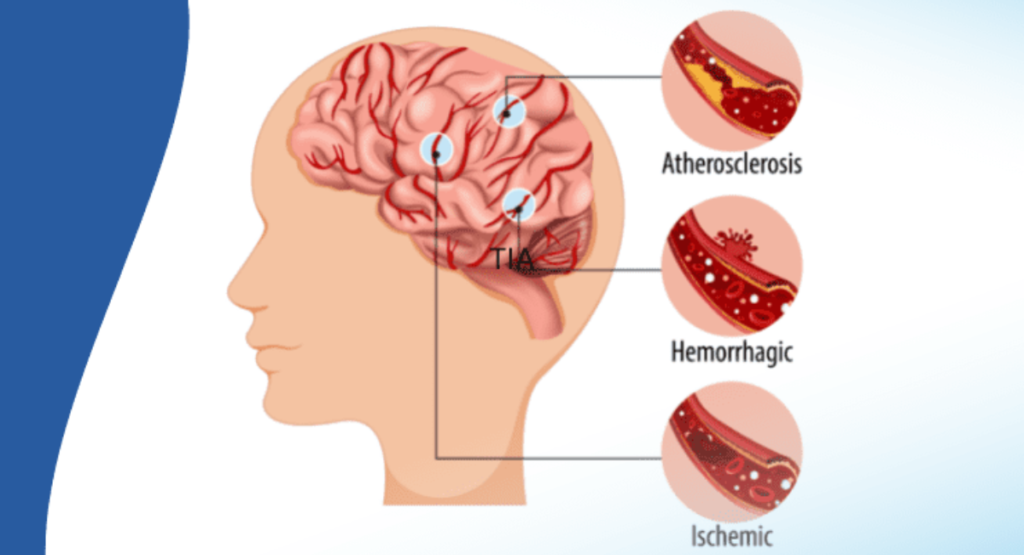As we hustle through our daily lives, it’s easy to overlook the signs our bodies give us, especially when it comes to something as serious as a brain stroke. Understanding the symptoms of a cerebral accident is crucial because timely intervention can be a matter of life and death. In this blog post, we’ll delve into the various symptoms of a brain stroke, the risks involved, and the actions to take if you or someone you know experiences them.
What is a Brain Stroke?
Before we discuss the symptoms, let’s grasp what a brain stroke is. A cerebral accident, also known as a cerebrovascular accident (CVA), occurs when there is a disruption in the blood supply to the brain. This can happen due to a blockage in the blood vessels (ischemic stroke) or the rupture of a blood vessel (hemorrhagic stroke). Regardless of the type, the consequences can be severe and immediate medical attention is imperative.
Symptoms of a Brain Stroke
Sudden Weakness or Numbness: One of the most common symptoms of a brain stroke is sudden weakness or numbness, typically on one side of the body. This can affect the face, arm, or leg and may occur suddenly without any apparent cause.
Difficulty Speaking or Understanding Speech: Another hallmark symptom is difficulty speaking or understanding speech. You may experience slurred speech, difficulty finding the right words, or even complete aphasia (inability to speak or understand language).
Trouble Walking or Loss of Coordination: A brain stroke can also manifest as trouble walking or loss of coordination. You may feel dizzy, unsteady, or find it challenging to maintain balance.
Severe Headache: In the case of a hemorrhagic stroke, a sudden and severe headache may occur, often described as the worst headache of one’s life. This headache may be accompanied by vomiting, altered consciousness, or seizures.
Visual Disturbances: Visual disturbances, such as blurred vision or sudden loss of vision in one or both eyes, can also be indicative of a brain stroke.
Facial Drooping: Facial drooping, particularly on one side of the face, is a classic symptom of a brain stroke. If you notice one side of your face drooping when you smile or try to lift your eyebrows, seek medical attention immediately.
Risk Factors for Brain Stroke
Understanding the risk factors associated with brain strokes can help identify individuals who may be more susceptible. Some common risk factors include:
High Blood Pressure: Uncontrolled hypertension is a leading cause of cerebral accident.
Smoking: Tobacco use significantly increases the risk of stroke.
Diabetes: Poorly managed diabetes can damage blood vessels and increase the likelihood of stroke.
Obesity: Being overweight or obese puts additional strain on the cardiovascular system.
High Cholesterol: Elevated levels of cholesterol can lead to the buildup of plaque in the arteries, increasing the risk of stroke.
Family History: A family history of stroke or certain genetic factors can predispose individuals to stroke.
Age: The risk of stroke increases with age, particularly after the age of 55.
What to Do If You Suspect a Brain Stroke?
Time is of the essence when it comes to treating a brain stroke. If you or someone you know experiences any of the aforementioned symptoms, it’s crucial to act quickly. Here are the steps to take:
Call Emergency Services: Dial emergency services immediately and provide them with all relevant information, including the symptoms observed and any medical history.
Note the Time: If possible, note the time when the symptoms first appeared. This information can help healthcare providers determine the appropriate course of treatment.
Stay Calm and Reassure the Patient: It’s essential to remain calm and reassure the individual experiencing the stroke symptoms. Panic can exacerbate the situation.
Do Not Delay: Even if the symptoms seem to improve or resolve on their own, it’s still crucial to seek medical attention. Stroke symptoms can fluctuate, and delaying treatment can have serious consequences.
Conclusion
Being aware of the symptoms of a brain stroke and understanding the risk factors can save lives. If you or someone you know experiences sudden weakness, difficulty speaking, or any other symptoms suggestive of a stroke, don’t hesitate to seek medical help. Remember, when it comes to a brain stroke, every second counts.
We are India’s first comprehensive continuum care provider. We provide multidisciplinary out of hospital care to acute and post-acute and chronically ill patients at our critical care facilities and your home.

